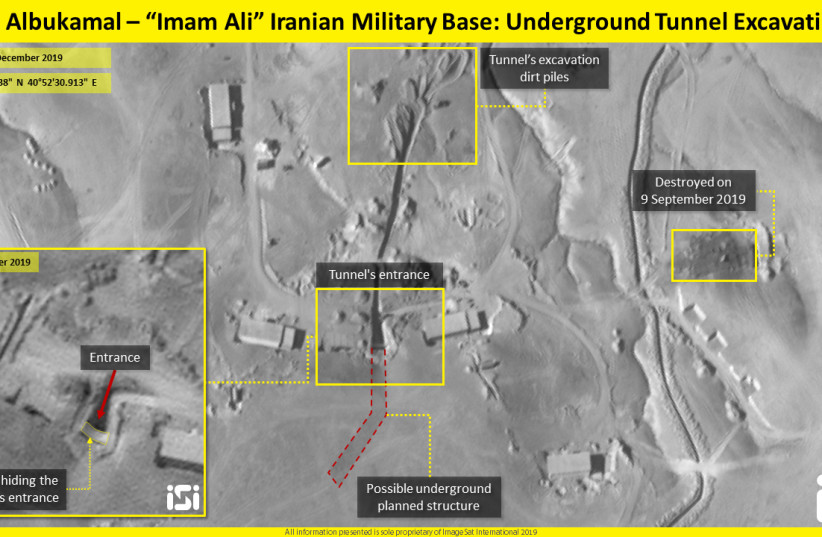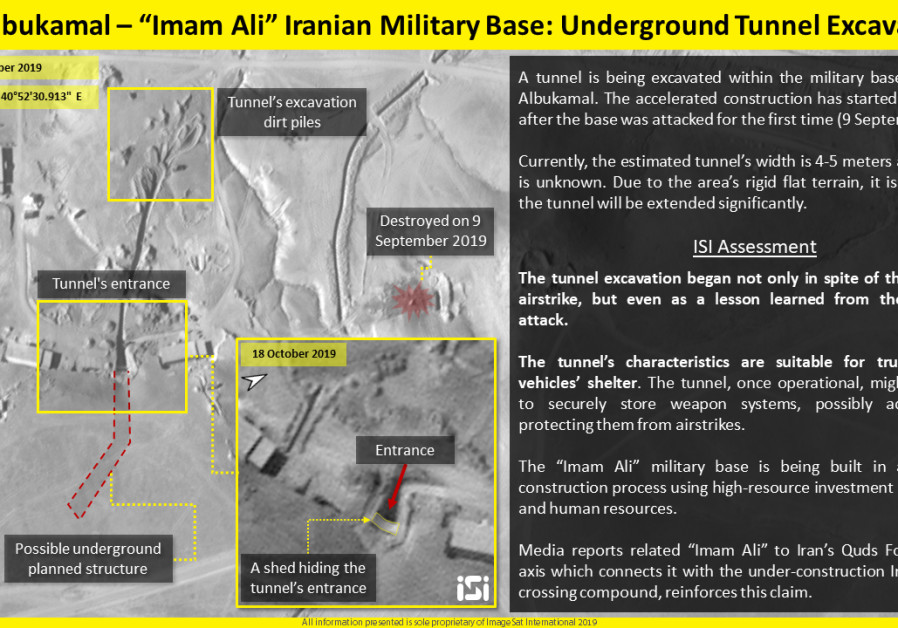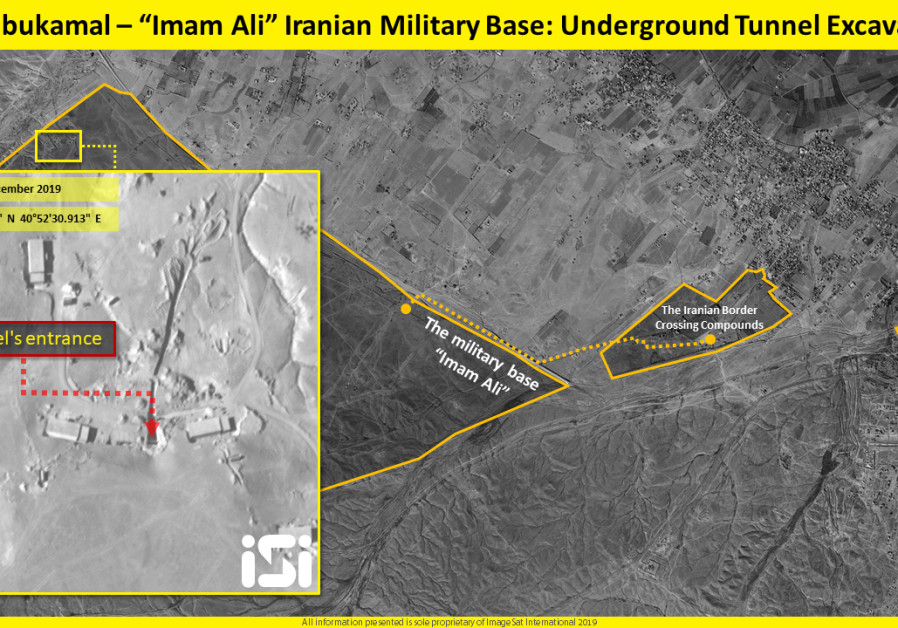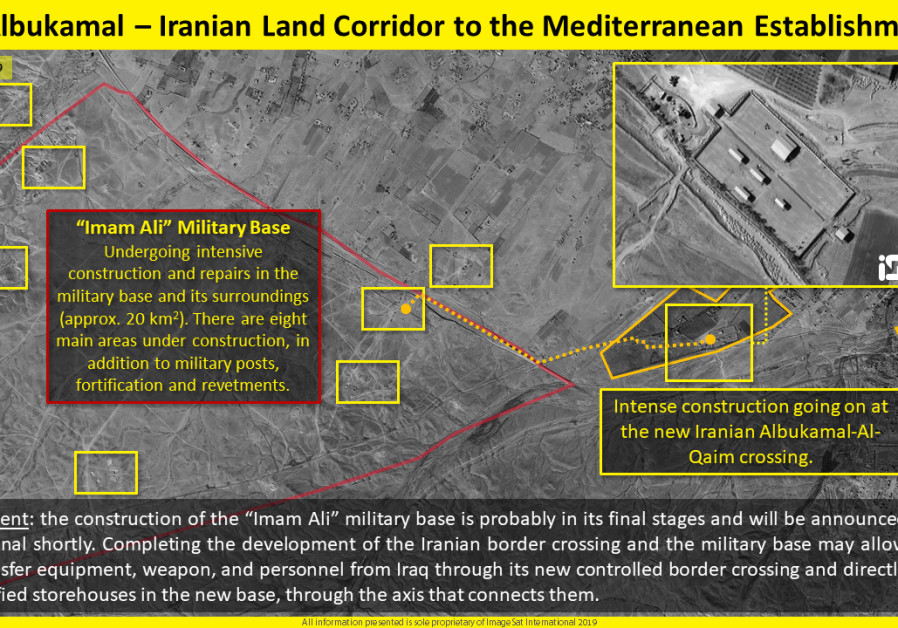by Seth J. Frantzman
Iran has begun building tunnels at its Imam Ali base in Syria, which is a key part of Iran’s infrastructure that links Iran via Iraq to Syria and Lebanon.
 |
Close aerial view of the Imam Ali Iranian military base in Syria where Iran is excavating underground tunnels
(photo credit: IMAGESAT INTERNATIONAL (ISI))
|
The tunnels are estimated to be 130 meters long and wide enough to drive a car through. Image Sat International (ISI), which provided the satellite images and wrote a report, noted that at least one tunnel is being excavated and that the construction accelerated “a few weeks after the base was attacked for the first time,” on September 9, 2019. In the wake of that attack, an Iranian Islamic Revolutionary Guard Corps group attempted to fire rockets at Israel from near Damascus.


“The tunnel excavation began not only in spite of the compound airstrike, but even as a lesson learned from the mentioned attack,” ISI wrote.Fox News said it consulted with Western intelligence sources which reviewed the information. The US has recently linked Iranian-backed groups to at least nine attacks near areas with US bases over the last year. These have involved rockets. In addition, Iraq’s government has accused Israel of several attacks in July and August. And Qais Khazali, leader of the Asaib Ahl al-Haq militia that was sanctioned by the US last week, has threatened the US and Israel. A New York Times report last week said that Iran transferred short range ballistic missiles to Iraq.Iran is building the Imam Ali base near a new border crossing at Albukamal in Syria. The border was reopened at the end of September after many years when it was closed due to the war on ISIS. But Iran’s base is in the desert just over some sand dunes near the crossing. It is now linked to the crossing.
A shed has been used to hide the entrance to the tunnel. “Large dirt piles appeared at the opposite end of the tunnel,” Fox News reports. Western intelligence sources say that missiles and weapons will be stored in the tunnel.

The tunnel now looks like the latest addition to a network of Iranian infrastructure near the border. It will add to Iran’s entrenchment in Syria and Iran’s “land bridge” or road to the sea that goes through several areas near the Euphrates River and then to way-points on the road to Damascus and Homs, called T2, T3 and T4.

The latter is an air base called T-4 or Tiyas, which has been hit by airstrikes and where Iran tried to bring in its 3rd Khordad air defense system in April 2018. Iran has also brought drones and other weapons to T-4 using large civilian-style transport planes.A report in Russian media claimed that Russian Sukhoi Su-35s scrambled on December 6 to stop an Israeli airstrike at T-4. Israel has been accused of carrying out other airstrikes at the same location. In February 2018 Iran launched a drone from T-4 that entered Israeli airspace and was shot down by a helicopter.The new Imam Ali base is a serious Iranian investment and shows its plans to link Syria and Iraq via Tehran’s hand. This is also here precision guidance, which might be trafficked to Hezbollah, a key concern. Israel warned that Hezbollah is trying to upgrade its 150,000 rockets with precision guidance in August.ISI has provided numerous reports and images of the Albukamal location, , going back to June 2018. It wrote a report on the Iranian “land bridge” in July 2018 and has consistently updated the report and images since. This was true in September after an airstrike where it was revealed several buildings at the Imam Ali base were struck. They appeared to be storehouses of some sort. Now, Iran is seeking to go underground. Iran has expertise in building tunnels and bunkers. Hezbollah built tunnels near the border with northern Israel. Some were revealed last December during Operation Northern Shield, which sought to locate and destroy Hezbollah tunnels.In May 2018, ISI revealed that Iran had built tunnels at its Fordow nuclear enrichment facility. “The imagery of Fordow enrichment facility shows a large presence of buses and private vehicles, as well as an opened gate which leads to underground tunnels.”
Seth J. Frantzman
Source: https://www.jpost.com/Middle-East/Iran-is-building-tunnels-in-Syria-near-Iraq-border-for-weapons-610501
Follow Middle East and Terrorism on Twitter
No comments:
Post a Comment